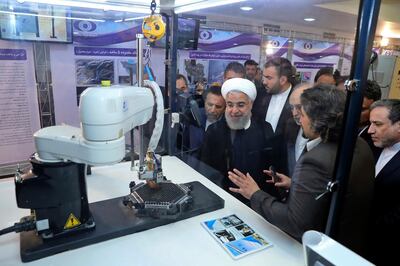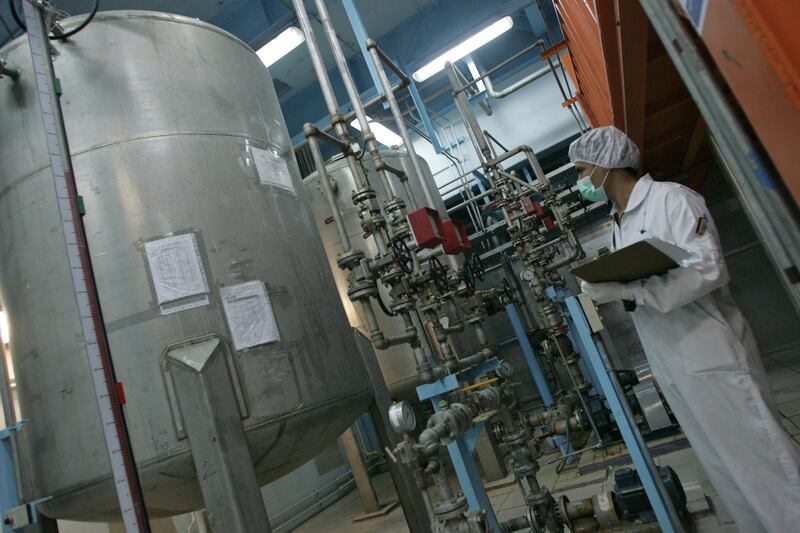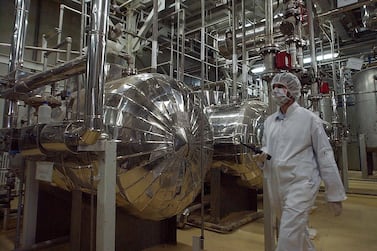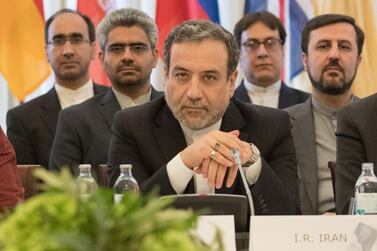Iran has breached the limits of the nuclear deal signed with world powers, presenting a major challenge to the US and to European countries who have tried to accommodate with Tehran.
Iranian Foreign Minister Javad Zarif said on Monday that Iran’s enriched uranium stockpile has exceeded limits of the 2015 accord.
His announcement was confirmed by the International Atomic Energy Agency.
The Trump administration urged the Iranian regime to "alter their course" in what it described as "malign behaviour".
"There is little doubt that even before the deal’s existence, Iran was violating its terms," the State Department said.
"We must restore the longstanding non-proliferation standard of no enrichment for Iran. The United States and its allies will never allow Iran to develop nuclear weapons."
Britain urged Iran to abide by the accord, with Foreign Secretary Jeremy Hunt saying he was "deeply worried" by the development.
Mr Hunt said the UK wanted to preserve the deal "but if Iran breaks that deal, then we are out as well".
The Iranian move constitutes a major escalation and could increase volatility in the Gulf, where tension between the US and Iran has played out in the past few months.
While not ruling out a diplomatic solution, Tehran initiated moves to counter Washington’s “maximum pressure” approach to Iran.
The Islamic Revolutionary Guard Corps last month shot down a US drone, an act that nearly resulted in retaliatory strikes by Washington.
The US has also blamed Iran for earlier attacks on six oil tankers near the Strait of Hormuz.
Days ago, the EU activated a financial system designed to help Tehran overcome US sanctions imposed after Washington pulled out of the nuclear deal.
The Iranian announcement is a slap in the face to European powers, especially France and Germany.
Iran criticised the two countries for not better using their financial influence to help it skirt the US sanctions. In particular, Tehran wanted the EU to enable large sales of Iranian oil.
Ryan Bohl, a political analyst at the US risk company Stratfor, said Tehran was banking on the breach being "small enough and justified", and counting on delayed and divided reaction from Europe to protect it from major repercussions.
“The wildest card is Israel as they will not tolerate a viable path to an Iranian nuclear bomb, especially with a US administration that would back Israel in case of a military strike,” Mr Bohl said.

Mr Zarif said Iran had warned that it exceed the limit and blamed Europe for forcing Tehran's hand.
He later claimed that Iran was acting within the nuclear deal, tweeting the message along with text from the agreement that provides a way to resolve disputes.
We have NOT violated the #JCPOA.
— Javad Zarif (@JZarif) July 1, 2019
Para 36 of the accord illustrates why:
We triggered & exhausted para 36 after US withdrawal.
We gave E3+2 a few weeks while reserving our right.
We finally took action after 60 weeks.
As soon as E3 abide by their obligations, we'll reverse. pic.twitter.com/bSxaMFaktH
E3 refers to Germany, Britain and France, while the E3+2 adds Russia and China.
At the regular pact review meeting in Vienna on Friday, Helga Schmid, head of the EU diplomatic service, said good progress had been made on containing Iran’s uranium enrichment.

Iran announced its intention to stop abiding by some commitments under the nuclear deal in May, a year after the US decision to withdraw from the accord and reimpose sanctions.
Last month, a report by UN Secretary General Antonio Guterres said Tehran was continuing to meet its obligations under the deal.
The UN assessment is partly based on the view of the international energy agency, which regularly monitors Iran’s uranium stockpiles of low-enriched uranium and other aspects of the deal.
Iran's low-enriched uranium stockpile on July 1 was 205 kilograms, above the limit of 202.8kg, Reuters reported.
The 2015 deal was signed by the five permanent Security Council members, plus Germany and the EU, where they agreed to ease penalties in exchange for the restrictions.
Washington has intensified sanctions on Tehran since pulling out of the deal, which US President Donald Trump wants to renegotiate.
The White House was unhappy with sunset clauses it said could allow a major relaunch of Iran's nuclear programme, the deal’s failure to halt development of ballistic missiles, and Tehran’s proxy militias destabilising the region.
The US last week designated people and entities that deal with Iranian supreme leader Ayatollah Ali Khamenei, or officials serving under him, for sanctions.
An Iranian breach of the nuclear deal could mean the UN Security Council automatically reimposes international sanctions.
Under the terms of the deal, the "snapback" sanctions may not require the approval of Russia or China, but they would need France, Britain or Germany to bring a complaint against Tehran.
But there are no signs of any EU consensus to take direct action against Tehran, which has relied on European reluctance to jeopardise relations.







